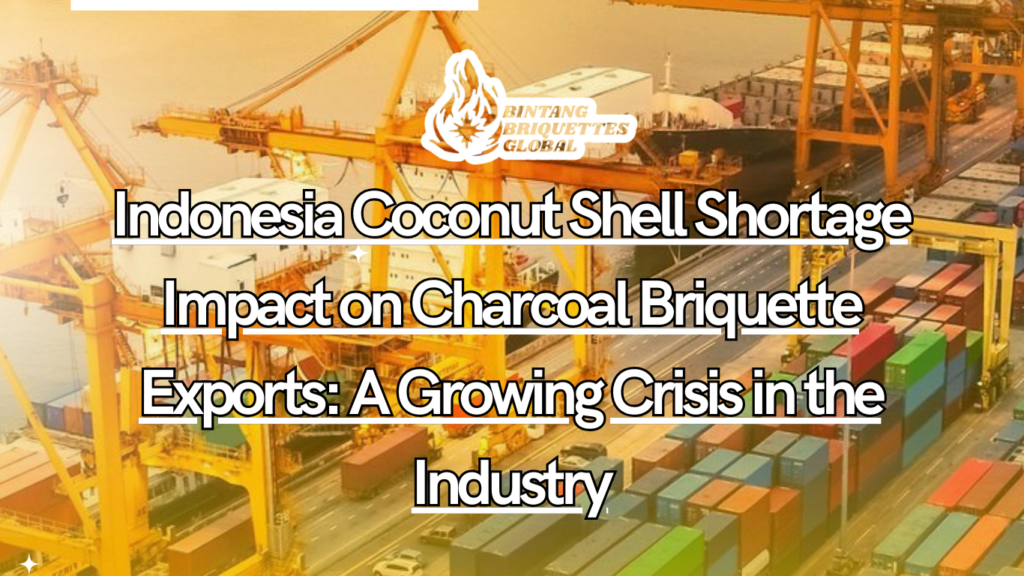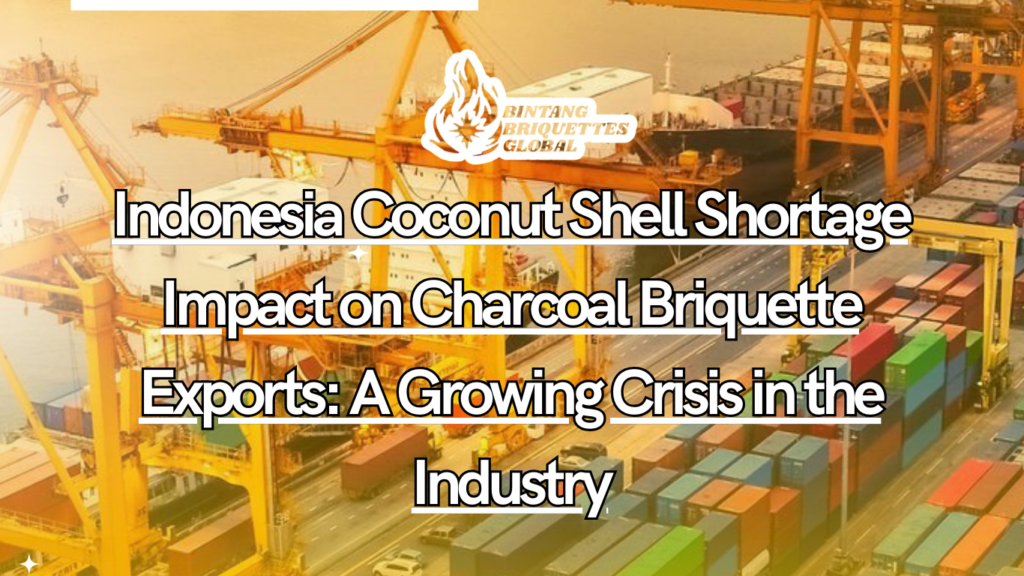
Indonesia coconut shell shortage impact on charcoal briquette exports severely critically threatens the country’s economy and industry. As one of the world’s largest coconut producers, Indonesia has long relied on coconut shells to produce eco-friendly and efficient charcoal briquettes. These briquettes, valued for their sustainability, long burning times, and clean combustion properties, are in high demand globally, particularly in grilling, energy production, and heating industries.
Read More : Green Energy Revolution: Coconut Shell Charcoal Briquettes Leading the Way
Indonesia is a major exporter of these briquettes, with key markets in Europe, the Middle East, Asia, and North America. However, the country is facing a growing crisis: a shortage of coconut shells. Coconut shells are a critical raw material for producing charcoal briquettes. This shortage threatens the future of Indonesia’s charcoal industry, particularly as the export of whole coconuts increases. This article discusses the causes of the coconut shell shortage, the effects on Indonesia’s charcoal briquette industry, and potential solutions to this growing problem.
2. The Coconut Charcoal Briquette Industry in Indonesia
Indonesia’s coconut charcoal briquette industry has experienced significant growth over the last few decades. The industry relies on coconut shells, a byproduct of coconut processing, to create charcoal. This charcoal is then processed into briquettes, which are in high demand across the world. The process of turning coconut shells into charcoal involves heating the shells in a low-oxygen environment to remove moisture, a process called carbonization. The resulting charcoal is dense, stable, and burns efficiently with minimal smoke and ash.
Coconut charcoal briquettes have become especially popular because they are an environmentally friendly alternative to wood-based charcoal. They burn hotter and cleaner, and they produce less ash. These properties make coconut charcoal briquettes a preferred choice in barbeque grills, industrial heating, and even as a renewable energy source. Indonesia has taken advantage of the global demand for coconut charcoal, making the country one of the largest exporters of these briquettes worldwide.
Coconut charcoal briquettes have thus become a key export product, with Indonesia providing over 60% of the world’s supply. This success has helped drive the Indonesian economy, creating jobs and supporting local coconut farmers. However, with the rise in demand for other coconut-based products, Indonesia now faces a serious challenge: a shortage of coconut shells.
3. Coconut Shells: What Are They, and Why Are They Essential?
Coconut shells are the tough, fibrous outer husks that remain after the coconut meat and liquid have been extracted. These shells are rich in carbon, which makes them the perfect material for creating charcoal. After harvesting, the shells are carbonized in a furnace, removing moisture and volatile compounds, leaving behind a dense and durable form of carbon: coconut charcoal.
This charcoal is then processed into briquettes, which are easy to transport and store. Charcoal made from coconut shells burns longer and more efficiently than traditional wood charcoal, making it a popular choice in grilling, industrial applications, and power generation. The clean-burning properties of coconut charcoal—producing less smoke and fewer pollutants—have made it highly sought after in global markets.
However, without a steady supply of coconut shells, manufacturers cannot produce these high-quality briquettes. As Indonesia’s demand for coconut shells has surged, especially due to the export of whole coconuts, the shells are becoming increasingly scarce. This shortage is threatening the viability of the coconut charcoal briquette industry.
4. The Surge in Whole Coconut Exports: Causes of the Shortage
In recent years, Indonesia has seen a dramatic rise in the export of whole coconuts. This increase is driven by growing international demand for coconut-based products such as coconut water, coconut oil, and coconut milk. Whole coconuts have become valuable commodities, particularly in markets focused on health-conscious consumers. This increase in whole coconut exports has led to a reduction in the number of coconut shells available for charcoal production.
When coconuts are exported as whole products, the shells, which would typically be used for charcoal, are left behind or discarded. As the demand for whole coconuts continues to grow, more coconuts are shipped abroad, while fewer shells remain in Indonesia. This creates an imbalance in the coconut supply chain, making it harder for briquette manufacturers to source enough raw material for production.
The result is a shortage of coconut shells, which is already having a direct impact on the charcoal briquette industry. With the scarcity of coconut shells expected to persist, manufacturers are struggling to meet both local and international demand for charcoal briquettes.
5. Effects of the Coconut Shell Shortage on the Charcoal Briquette Industry
The coconut shell shortage in Indonesia has several far-reaching effects on the charcoal briquette industry.
Reduced Production Capacity: The most immediate effect of the coconut shell shortage is a reduction in production volume. With fewer coconut shells available, manufacturers cannot produce as many briquettes. This decrease in production means that many orders are delayed, and international buyers are left without a steady supply of Indonesian briquettes.
Higher Raw Material Costs: As the supply of coconut shells decreases, the price of these shells increases. This inflationary pressure pushes up the overall cost of producing charcoal briquettes. Unfortunately, these higher costs are often passed down to the consumer, resulting in more expensive briquettes. As a result, Indonesian briquettes may become less competitive in international markets, especially when compared to cheaper, wood-based charcoal.
Deterioration of Product Quality: When coconut shells become scarce, manufacturers are forced to use alternative or lower-quality shells. This compromise leads to lower-quality charcoal briquettes, which may burn less efficiently, produce more ash, and emit more smoke. These issues can damage the reputation of Indonesian charcoal in the international market, as buyers expect consistent, high-quality products.
Loss of Market Share: The increased costs and reduced product quality can lead to a loss of market share. International buyers may start looking for other suppliers of charcoal, such as the Philippines, Sri Lanka, or other coconut-producing countries. If the shortage persists, Indonesia risks losing its dominant position in the global market.
6. The Economic Impact: Local Producers and International Buyers
The shortage of coconut shells has significant economic implications for both local producers in Indonesia and international buyers.
Impact on Local Producers: Many small-scale producers depend on a steady supply of affordable coconut shells to stay competitive. When prices rise or shells become hard to find, these small businesses may struggle to survive. Higher production costs could force many to shut down or scale back their operations, resulting in job losses and decreased local income. This could create social instability in rural areas where the coconut charcoal industry provides jobs and livelihoods.
Impact on International Buyers: For international buyers, the coconut shell shortage poses a significant risk. These buyers—who import large quantities of Indonesian briquettes for grilling, heating, and industrial uses—could face increased prices and supply shortages. If the shortage persists, they may have no choice but to seek alternative sources of charcoal, potentially from countries that use less sustainable materials.
Economic Loss for Indonesia: The charcoal briquette industry is an important part of Indonesia’s economy, particularly in regions where coconuts are grown. If the coconut shell shortage continues, the country could see a decline in export revenues and foreign exchange earnings. Indonesia’s reputation as a leading exporter of coconut charcoal may also suffer, leading to long-term economic consequences.
7. Possible Solutions to the Coconut Shell Shortage
Several solutions can help mitigate the effects of the coconut shell shortage and ensure the sustainability of Indonesia’s charcoal briquette industry.
1. Diversification of Raw Materials: Briquette manufacturers could look to alternative materials such as palm kernel shells, bamboo, or agricultural waste. These materials may not have the same properties as coconut shells, but they can help reduce the pressure on the supply of coconut shells and allow manufacturers to continue production.
2. Sustainable Sourcing of Coconut Shells: The Indonesian government and private sector could work together to develop more sustainable sourcing practices. By optimizing coconut processing techniques and reducing waste, they can help ensure that coconut shells are used efficiently. Encouraging farmers to sell shells as part of a sustainable coconut industry could ensure a more reliable supply.
3. Policy Interventions: The Indonesian government could implement policies that favor the use of coconut shells in charcoal production. For example, the government could offer incentives for the export of processed products like coconut charcoal briquettes, rather than exporting whole coconuts. This would help secure the supply of coconut shells for local use.
4. Investment in Innovation: Manufacturers could invest in technology to improve the efficiency of charcoal production. Innovations in carbonization processes and briquette molding could help reduce the need for raw material while maintaining product quality.
8. Conclusion Indonesia coconut shell shortage impact on charcoal briquette exports
Indonesia coconut shell shortage impact on charcoal briquette exports is becoming an escalating concern for the country’s charcoal briquette industry. This shortage is mainly driven by the increase in whole coconut exports, which reduces the availability of coconut shells for charcoal production. Consequently, manufacturers are facing higher production costs, reduced output, and potential declines in the quality of their products. If this issue is not resolved, Indonesia could risk losing its leadership position as the global exporter of coconut charcoal briquettes.
However, by adopting solutions such as diversifying raw materials, improving sustainability in coconut farming, and implementing government policies that prioritize charcoal production, Indonesia can safeguard its position in the global market. It is essential for the industry to innovate, adapt, and work together to address the coconut shell shortage and ensure the continued success of Indonesia’s charcoal briquette exports.

